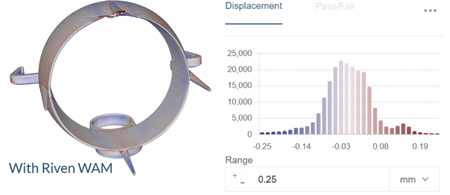
A typical part printed on an FFF system shows significant deviations from the design. Red areas are oversize, blue areas are undersize and grey areas match the design. A histogram shows error distribution.

A warp-adapted-model (WAM) generated with Riven and printed on the same printer shows 10X lower total deviations.
Riven, a provider of 3D reality intelligence for digital manufacturing, has developed Warp-Adapted-Model (WAM) capability that enables higher accuracy additive manufacturing (AM) part production.
WAM uses full-part 3D data from an initial part to identify errors and produces a new corrected model in minutes that eliminates warp and is up to 10x more accurate when printed. Riven customers are using WAM to enable more accurate production parts.
"WAM capability has been tested extensively and has shown improvement across a wide variety of AM technologies, including FFF, SLA, metal binder jetting and MJF," said a company spokesperson. "WAM improves parts made by nearly any AM technology or machine. WAM technology improves quality and accuracy for every build from every machine for all additive technologies-even proactively correcting errors on legacy equipment."
The spokesperson continued, "Unlike simulation approaches to improve AM part quality for specific technologies and machines, WAM works for any additive technology without the need for detailed knowledge of the specific machine or material parameters. WAM is complementary to simulation-based approaches and can be used alone or in combination to correct remaining errors related to environmental conditions or imperfect simulation input."
In a comprehensive FFF trial, average print errors were reduced by over 2.8x where the accuracy score improved from 80% to 93% (where errors are defined as areas with deviation over 0.25 mm). Trials were conducted with three different part types and in three different materials.
WAM is scalable, making AM a viable option for customers with projects that only need a few units to those that require thousands or more. Riven is developing joint solutions with leading AM equipment and AMES partners to open new markets for AM production across industrial, automotive, aerospace and consumer applications.
Riven is also pre-release testing PWAM, a predictive machine-learning driven version of the technology that creates pre-adjusted models automatically and will deliver even greater economies of scale and minimize production of scrap parts.
For more information contact:
Riven
riven.ai